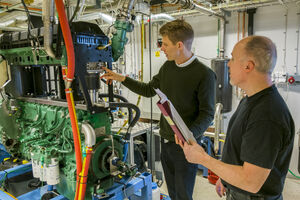Fuel Effects
Combustion engines transform chemically bound energy to kinetic energy taking a detour via heat. The heat release is coupled to the fuel's properties and composition. These thereby affect the engine's energy consumption, power, cold start performance and exhaust gas composition. Each fuel sets its own demands on engine hardware and controls. Our research aims at generating knowledge about how various fuels work and how fuels and control systems are best adapted to each other. One example is our basic research for creating new fuel definitions. Another is the development of the PPC concept, which uses a diesel engine base along with gasoline-like fuels. The combination provides exceptional fuel economy and very low emissions.
We also pursue extensive research on the future fuels that are a prerequisite for a sustainable society. Examples are biofuels like ethanol, butanol, FAME and biogas, but also fuels that can be categorized as liquid electricity. This could for instance be methanol produced using electricity from sun or wind, providing a new potential to integrate society's energy use and make it more efficient.

